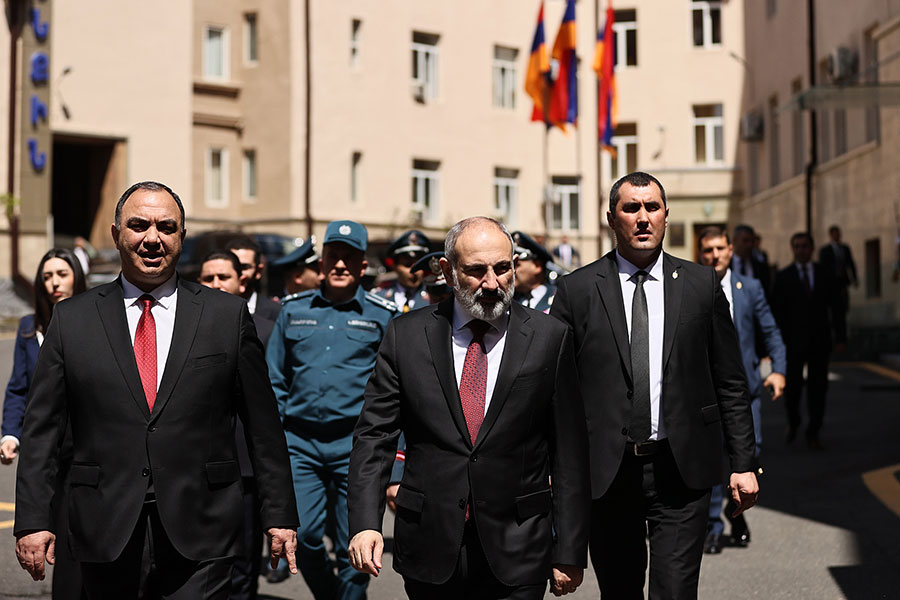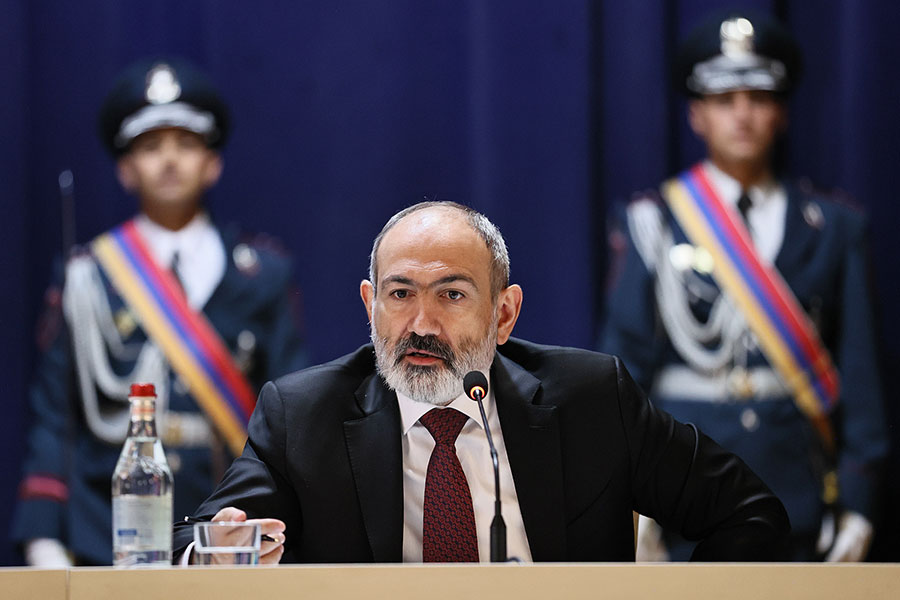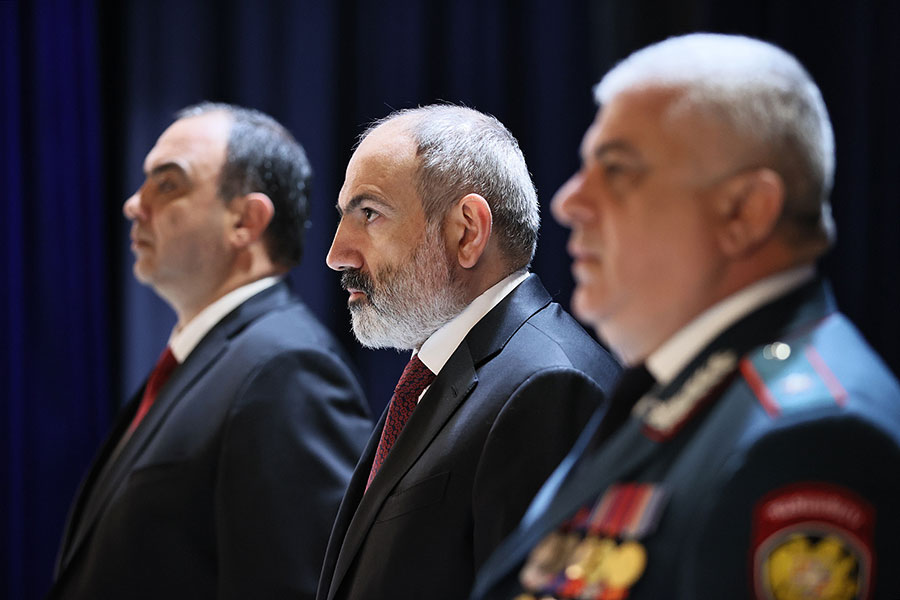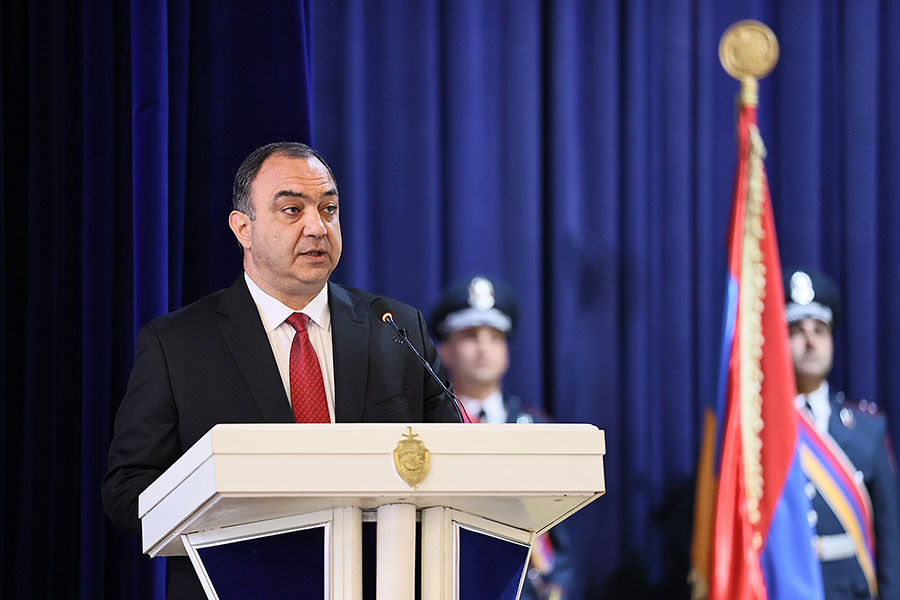Prime Minister Nikol Pashinyan participated in the solemn session of the collegium dedicated to the 106th anniversary of the Police at the Ministry of Internal Affairs. Before the session, Nikol Pashinyan and Minister of Internal Affairs Vahe Ghazaryan laid flowers on the plaque placed in the courtyard of the Police building and paid tribute to the memory of policemen who sacrificed their lives for the motherland.
At the session, the Prime Minister made a speech, congratulated all the Police officers and thanked them for their work. “I also want to thank you for the support that the Police as a whole and every Police officer is giving to the reform agenda that we are implementing within the Police and the Ministry of Internal Affairs in general.
When we started the Police reforms, many people said that before implementing them, we need to carry out mass personnel changes in the Police because there are different people there, who have worked at different times and in different ways, etc., and they will not allow and will show resistance to the reform process. But we were not of that opinion, and we still are not of that opinion today, because we considered that first of all it is very important to carry out any changes and reforms based on the previously accumulated experience. Because nothing is created from scratch or what is created from scratch is much more complicated, much more ineffective than moving forward knowing all the information, knowing both our mistakes, our advantages, and our shortcomings.
Read also
Second, we believe that in this period of general change, each of us should eventually have the opportunity to change, to reform, to become more professional, because none of us are perfect, not only us, but in general, no one, be it inside this hall or outside this hall, is perfect. And, in general, it should be noted that there is also an objective reality that changing anything is the most difficult task. And there are two reasons for that.
The first reason is that, however, the current situation, even though it has many negative aspects, if not all, many have already accepted that situation and made themselves comfortable in that less-than-perfect situation. And it’s always difficult to move from that point with a different goal.
Secondly, which is an objective circumstance, we need to admit it: you can never be sure that the change you make will lead to a better result than what you have now, because when you change something, there is always a risk that you will see on the way or in the end that you didn’t really achieve your goal, you caused a lot of noise, a lot of changes, but there was no result. Therefore, the process of change is actually very complicated. Also, I think that we, as a public, as well as I, as the Prime Minister, and the government, in this regard, appreciate the approaches of the Police officers regarding these changes and processes. The most important thing I appreciate is that today the Police and Police representatives do not have the position to show at every step that these reforms are not going well, although I repeat that no change is perfect and every change contains risks. I want you to know that I greatly appreciate this approach and understanding.
We also see problems, the Minister of Internal Affairs talked about how many police officers passed the certification process. The number is actually small, and here we can give two approaches. From the point of view of the police, it may seem that this process is something formal, they made this big noise just to raise the salary of, let’s say, 191 officers out of thousands. This point of view has the right to exist, but on the other hand, the biggest meaning of these reforms is that we have within us a constant stimulus for progress and a push for progress, not by command, by instruction, but by a constantly working mechanism.
I might say something rude, but we want a policeman’s kid to encourage his mom or dad by saying: why isn’t your salary twice as high? In other words, the government should not push for continuous actions, administrative decisions, but the policemen do it among themselves, and also we know that that a good example is always contagious. I hope that those who passed with honors will not become a reason for temptation or division among the co-workers, but on the contrary, will become a new stimulus. This is not a one-time action, but our political decision is that from time to time, apparently, every five years a policeman should know, after the cycle of each five years, how much his salary can be, after 20 years, how much it can be, because everyone wants to plan life for the long term.
And this is an important process, and we are not doing this to show or create problems that we do not want to pay that salary immediately and directly, we want to establish institutions in the Republic of Armenia, and to put continuous development mechanisms and motivations at the basis of the establishment, so that even without political will, that mechanism will work, and we will be convinced that this mechanism of development is placed at the basis of the activity of the service and the bodies of the Ministry in general.
It is also very important that both the public, the government and the police themselves constantly return to the meaning and content of their service. For me, for example, it’s a very important question, because it seems like trivial questions, but for example, what is the police for, in general? Such questions are not asked because it seems that why would such questions be asked, is it not clear what they are for? And when you come, you get to that point, it turns out, let’s say, in a very respectable audience, that they say it’s very clear, what is there to ask, but when asked to put it in one sentence, it turns out, that there is a lot of complexity in formulating that one sentence. But it is very important to address this issue every time. For example, on the eve of Police Day, I asked myself what is the function of the police, apart from law and order in legislation, public order, but what is the next layer that should be addressed, delved into down to the molecular level? I recorded, and this may sound strange, for example, the police, in its function, in some sense, performs the function of an internal, inter-society border guard.
And therefore, what is the meaning and function of a policeman, a border guard? The Police protect and maintain the boundaries of the citizen’s freedom. At the same time, the Police guard the borders of the citizen’s freedom and rights from two sides. First, the Police must take care so that no one violates and encroaches, that is, the border of a citizen’s freedom and right does not encroach into the territory of another’s freedom and right, and at the same time, the citizen himself does not violate the border of his freedom and rights and invade the territory of another’s rights and freedom. This is very important for the public and all of us to understand because sometimes there are people who try to create a negative image of the Police Service.
Unfortunately, we have great traditions in this. One part in the context of the criminal subculture, the other part in a different context, but it is very important for us that every person understands that it’s he who needs the Police Service, everyone. Even those who are satisfied or dissatisfied with the Police Service, because if you imagine for a moment what will happen in any country if there is no Police and no service is provided. Therefore, the Police must have leverage to protect the border of the citizen’s liberties from both sides.
It is no coincidence that the police is one of the structures, and the main one, which is commonly called a law-enforcment structure. But this does not mean that force is the primary tool of the Police. No, force is the last tool of the Police. But if there is no possibility of power influence in any process, the usual conditions may not apply. And we must understand this too, because if, for example, the Police is not a enforcment structure or the Police does not have the right and opportunity to use force, that service will be meaningless in its content, but it must be based on law and right. This is very important. I have noticed in recent years, there comes a period when the Police are accused of being too soft, there comes a period when the Police are accused of being too tough, and so on and so forth. But the right thing to do in this process is to find the right balance from the point of view of law and justice.
And of course, the primary goal of the Police should be to do everything, to take all possible and impossible measures, so that there is no need to use force. This, by the way, is a matter of professionalism. Recently, there was an incident at the Nor Nork police station, and I want to thank the police officers who used force and largely neutralized it. But they did not use the most extreme methods of force, they were able to avoid it. This also speaks of the level of professionalism, and in our certification processes we must also develop these skills, because it is clear, not always, but there are also cases that it is possible to neutralize a threat directly by talking to a person, through psychological contact, through human contact.
I am sure and I know that there are dozens, if not hundreds and thousands of such cases in the Police throughout its history. But it is also important that Police action is fully based on law and right, but the problem here is that sometimes even when Police action, including force, is based on law and force, it does not always produce such universal encouragement.
Here I want to talk about a fundamental problem that has absolutely nothing to do with the Police. Sometimes I notice that the citizens of the Republic of Armenia do not consider themselves to be the source of law and justice. In other words, they do not consider that they created the law and the right, directly or indirectly, but this is already a problem of different political and socio-psychological level, which is largely related to the question whether legal order was ultimately formed through the free expression of the citizen’s will, or it was not formed through free will expression.
I want to go here again and get to the history of our constitutions, and the question is ultimately here, when the next day we publish the results after the constitutional referendums, does the citizen sitting in front of the television say to himself that it was me who made this decision or not? When he does not say so, this is where the problems in relation to the legal system arise. But I say again, this has nothing to do with police activity, or at least mostly nothing to do with it.
And I want to conclude by congratulating and thanking all of you for your service. The minister emphasized, and I think it is a very important circumstance, I especially want to thank your family members. Today, in general, it is very difficult to do any work without the support of the family, especially the work of a police officer.
And one can imagine what inconvenience this creates for the families of Police officers, when officers can leave family events incomplete or not show up at all. This tolerance, if you can say so, really deserves deep appreciation and respect. Once again, I want to congratulate and thank the police officers and their family members. Good service and good luck to all of us,” said Nikol Pashinyan.
On the occasion of Police Day, a group of employees of the Ministry of Internal Affairs were awarded with the the Prime Minister’s commemorative medal and a letter of gratitude for their contribution to the protection of law and order.
INFORMATION AND PUBLIC RELATIONS DEPARTMENT OF THE OFFICE OF THE PRIME MINISTER OF THE REPUBLIC OF ARMENIA

























































